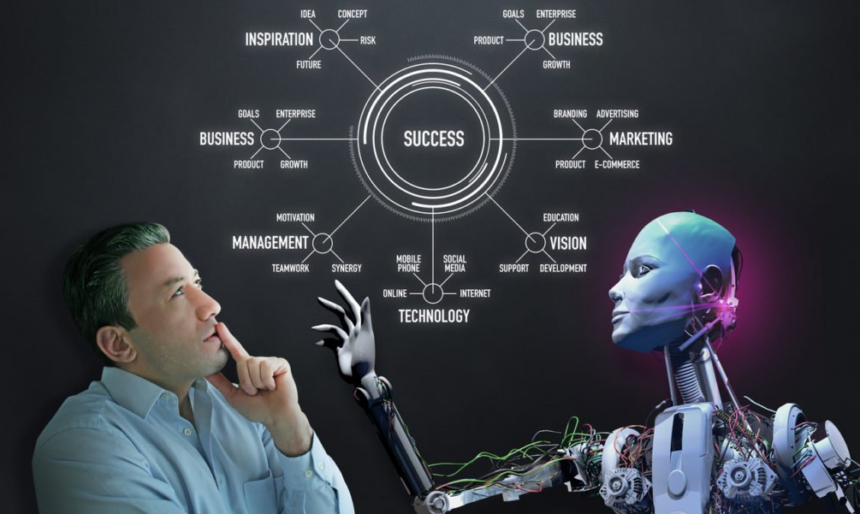As we progress further into the 21st century, the boundary between human intelligence and artificial intelligence (AI) becomes increasingly blurred; prompting discussions, debates, and speculations about the roles each will play in our future. Understanding the differences between these two forms of intelligence is essential for navigating this evolving landscape. This article delves into the fundamental distinctions between AI and human intelligence, supported by recent examples and developments.
Nature and Origin
Human intelligence is a product of millions of years of evolution, characterized by the capacity for abstract reasoning, self-awareness, emotional understanding, and social interaction. It is inherently biological, rooted in the complex neural networks of the human brain, and shaped by individual experiences, cultural context, and genetic predispositions. In contrast, artificial intelligence is a creation of human ingenuity. It is engineered through algorithms, data processing, and computational power. AI systems are designed to simulate certain aspects of human cognition, such as learning, problem-solving, and pattern recognition. However, they lack the organic nature of human thought and are confined to the parameters set by their programming and the data they are trained on.
Learning and Adaptation
Humans learn through a combination of instruction, experience, and social interaction. This learning is dynamic and multifaceted, encompassing not only the acquisition of factual knowledge but also the development of skills, intuition, and emotional intelligence. Human learning is often heuristic, meaning it involves trial and error, and is influenced by a complex web of emotions, motivations, and social factors.
AI, on the other hand, learns primarily through data. Machine learning, a subset of AI, involves training algorithms on vast datasets to recognize patterns and make predictions. This process is typically supervised (where the model is trained on labeled data) or unsupervised (where the model identifies patterns without labeled data). While AI can process and analyze data at a scale and speed far beyond human capability, it lacks the intrinsic understanding and contextual awareness that characterize human learning.
Creativity and Problem Solving
Human intelligence excels in creative thinking and problem-solving. Humans can approach problems from multiple angles, draw from diverse knowledge bases, and employ abstract and lateral thinking to arrive at innovative solutions. Creativity in humans is also deeply connected to emotional expression, cultural influence, and personal experience.
AI can generate creative outputs, such as composing music, writing poetry, or creating visual art, by analyzing existing works and identifying underlying patterns. For instance, OpenAI’s GPT-4, a state-of-the-art language model, can generate coherent and contextually relevant text, mimicking human-like creativity. However, AI-generated creativity is fundamentally different; it is derivative rather than original, as it relies on pre-existing data rather than genuine inspiration or personal experience.
Emotional Intelligence and Social Interaction
One of the hallmarks of human intelligence is emotional intelligence—the ability to recognize, understand, and manage our own emotions and those of others. This capacity is crucial for effective communication, empathy, relationship-building, and conflict resolution.
AI systems, despite advancements in natural language processing and sentiment analysis, do not possess true emotional intelligence. They can simulate conversational responses and recognize certain emotional cues in text or speech, but this is based on programmed algorithms rather than genuine emotional awareness. For example, customer service chatbots can handle basic inquiries and simulate empathy, but they lack the depth of understanding and nuanced responses that come naturally to humans.
Decision Making
Human decision-making is influenced by a blend of rational analysis and emotional input. It is often guided by values, ethics, and a sense of responsibility. Humans can weigh long-term consequences, consider the broader context, and make judgments based on incomplete or ambiguous information. AI decision-making is rooted in data and predefined algorithms. AI excels in scenarios where decisions can be made based on clear, quantifiable data. For example, in healthcare, AI can assist in diagnosing diseases by analyzing medical images with high accuracy. However, AI can struggle with decisions that require moral judgments or the consideration of complex, multifaceted human factors.
Latest Developments and Examples:
AI in Healthcare
AI’s role in healthcare exemplifies its strengths and limitations. IBM’s Watson, for example, can analyze vast amounts of medical literature and patient data to provide diagnostic and treatment recommendations. While AI can process information more quickly and thoroughly than a human doctor, it lacks the ability to make nuanced judgments based on a patient’s unique circumstances, history, and preferences.
AI in Art and Entertainment
The creative capabilities of AI have seen significant advancements. OpenAI’s DALL-E, an AI model that generates images from textual descriptions, has demonstrated remarkable creativity. However, while DALL-E can produce visually stunning and conceptually intriguing images, it does so by drawing from existing data, lacking the original thought process that human artists possess.
AI in Autonomous Vehicles
Self-driving cars, such as those developed by Tesla, utilize AI to navigate and make driving decisions in real-time. These systems use a combination of sensors, cameras, and machine learning algorithms to understand and respond to their environment. However, the ethical and safety implications of AI-driven vehicles highlight the limitations of AI in making complex, real-world decisions, particularly in unpredictable situations.
Conclusion
The distinction between artificial intelligence and human intelligence lies not only in their origins and mechanisms but also in their capabilities and limitations. Human intelligence is characterized by its adaptability, emotional depth, creativity, and moral reasoning. AI, while powerful in data processing and pattern recognition, lacks the intrinsic understanding and contextual awareness that define human cognition. As AI continues to evolve and integrate into various aspects of society, it is crucial to recognize and appreciate these differences. By doing so, we can better harness the strengths of both forms of intelligence, ensuring that AI serves as a complementary tool that enhances, rather than replaces, human ingenuity and wisdom. The future of AI holds immense potential, but it is the unique qualities of human intelligence that will ultimately guide and shape this technological frontier.
(Author is Scientist, MRCFC- khudwani, SKUAST- Kashmir. Feedback: [email protected], [email protected]. Visiting Scientist, University of Nebraska Lincon, USA)








